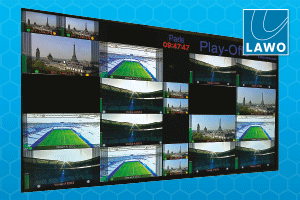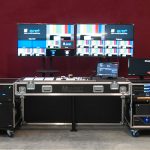This year, the African Cup of Nations in Egypt made history with special 4K coverage of 10 of its 52 matches, based on a 24-camera set-up.
In an exclusive interview with Vijaya Cherian, Egyptian systems integrator Technology KAR explains how it pulled this off within a very tight timeframe.
The 2019 CAF Africa Cup of Nations (AFCON 2019) was the biggest football event ever held on the African continent, and required a lot of meticulous planning, infrastructure deployment, and production and transmission expertise to ensure seamless live production and transmission for television. Although initially scheduled to be hosted in Cameroon, delays in infrastructure delivery resulted in the tournament being shifted to Egypt at the last minute. It was successfully hosted and televised from June 21 to July 19, with 52 matches taking place in the cities of Cairo, Suez, Ismailia and Alexandria.
Egypt is no stranger to AFCON. The country also hosted the Cup in 1959, 1974, 1986 and 2006, and has won the tournament seven times, more than any other country.
One of the big aspects of any sporting event today is sophisticated TV delivery, and AFCON was no exception. The Egyptian government bodies – the Local Organising Committee (LOC) and the Technical Research Department (TRD) – involved wanted to raise the profile of the 2019 event. To that effect, they mandated that the opening and closing ceremonies, as well as some of the matches in Cairo – the main site – be produced and broadcast in 4K for the first time in the history of AFCON.
Egyptian systems integrator Technology KAR was tasked to be the main service provider for TV production, and to select international partners to help bring the best viewing experience to football fans.
“Technology KAR has been working on a number of government and national television projects, as well as projects within the private sector. We have installed and implemented many TV studios, playout centres and end-to-end TV station projects in Egypt, so we were a natural fit to run this project,” explains Khaled Raouf, Chairman, Technology KAR.
The systems integrator roped in sports production specialist Mediapro Middle East to undertake the production of the event, and chose Globecast for transmission. Globecast had provided a range of services for several previous editions of the tournament.
“The TRD were charged with supervising the whole project in terms of the technical infrastructure and producing the sport for TV,” clarifies Raouf. “They in turn requested that we go beyond the traditional CAF requirement for HD production and broadcast and include 4K TV production of the games in the main tournament stadium, and broadcast the opening and final games in 4K.”
There were several mandates for this event from different bodies, some of them firsts. For example, the opening match and the final were broadcast in 4K using HEVC encoding.
“The CAF, for instance, stipulated the need for 1 +1 redundant satellites and a minimum of six HD OB vans with 24 cameras for each match; the TRD and the Egyptian government wanted to ensure 4K production and transmission for some of the matches,” explains Osama Kotb, Sales and Business Development Director, Technology KAR.
The tournament took place in six stadiums in four cities – three in Cairo and one each in Alexandria, Suez and Ismailia – so Technology KAR had its work cut out for it. TV production, after all, was a massive chunk of the project. The company worked with local entities whom TRD engaged to lay out the infrastructure, including Mantrac Egypt for power and Egypt’s Ministry of Communications and Information Technology – through its TE Data & Telecom Egypt companies – for the telco infrastructure.
“After signing the contract, we had to work with the other integrators to ensure that the production and broadcast infrastructure in all the venues, including the broadcast cameras network, the power network and telecoms infrastructure, were all in place. We had to ensure that they were compliant with the TV production specs given to us. The TRD assisted with supervising and guiding all integrators working on the project,” explains Ayman El Rouby, Project Manager at Technology KAR.
The systems integrator was also responsible for ensuring that Mediapro and Globecast met the requirements stipulated by the sports bodies. It provided the entire logistical expertise and liaison with the LOC for the international companies that came on-site, adds El Rouby.
Spanish company Mediapro, which had worked on several previous editions of AFCON, was already familiar with the scope of work and brought in six OBs from Turkey, Spain, France and Italy to be stationed in Egypt for the duration of the event. It also brought 500 people from the Americas, Portugal, Spain, France, Italy, Turkey, Tunisia, Morocco, Egypt, Kenya, Lebanon, Palestine, Cairo and the UAE to work on event coverage, with 80 to 100 crew dedicated to each match.
“Mediapro is involved in television production services and sport events around the world, and they were our choice because they possess one of the largest fleets of HD and 4K mobile units in the world, fully equipped with state-of-the-art technology to meet the production news. They also have a vast roster of technical and operational crew for their OB vans and cameras. We were not just looking for someone who could provide the equipment, but also someone who could bring their expertise to the event. We evaluated many companies and then went with Mediapro Middle East. Besides, they have experience covering many of the AFCON tournaments, including the one in Gabon, so they were a natural choice,” explains Kotb.
Mediapro came armed with five large HD OB vans and one 4K OB van; the latter was used to cover matches in Cairo. Six full production crews were on different sites to cover the events. A 24-camera set-up including four super slow-motion cameras, two ultra slow-motion cameras and three MiniCams were part of the inventory.
“42 matches were produced in high definition, while 10 matches, including the opening and final matches, were produced and broadcast in 4K,” explains Hosam Kandil, Technical Manager at Technology KAR.
To give an idea of the scale of the project, Omar Pleite Guerra, GM of Mediapro Middle East, says: “Each OB van required a team of around 50 people for just operations. These included the ENG crew, the graphics experts, tracking specialists and camera operators especially for the Skycams, which were provided for all the matches in the Cairo stadiums. We provided three Skycams for three stadiums. We also produced the silhouettes for all the African team players and had 15 ENG systems working on-site. If you include the logistics team, the drivers and the producers, each match required around 80 to 100 people.”
One interesting addition from Mediapro was a flying camera system based on four stabilised axes, with the camera head passively stabilised by gyroscopes and actively stabilised by electronic IMU devices. The maximum speed for this is 10m/s, with six function controls: pan, tilt, Dutch roll, zoom, focus and iris.
Perhaps the biggest challenge was time. With the contract not awarded until February 2019, the Technology KAR team had to move quickly to ensure that the sites and venues had the infrastructure to host the games.
Technology KAR and Mediapro worked on OB van production plans for the match venues. There were periodic inspections of the venues, the OB vans and the TV compound set-up to review further requirements such as camera platforms, commentator positions, cabling and broadcast infrastructure.
“Egypt took the role of hosting this tournament only in February, so aligning all of this production with Mediapro and inspecting all the OB vans took a lot of time. We did all this with our own local team,” explains Kandil. “In addition, a lot of redundancy and back-up needed to be prepared in advance.”
For Mediapro, the bigger challenge was the location of the stadiums. Crew had to be posted in Alexandria, Cairo, Suez and Ismailia, as travel between them would have been cumbersome, so different technical teams accompanied each OB van to different sites, with 15 producers working on planning, booking and coordination. Mediapro also set up a temporary office to coordinate logistics, freight, transport, flight booking and so on.
Several entities were involved in the project at different levels. Lagardère Sports, the sports and entertainment agency subsidiary of Lagardère Group, was responsible for handling the event’s rights management with the broadcasters, as well as providing satellite distribution of the multilateral feed and unilateral feeds for all 52 matches.
Globecast helped distribute the signal to Europe, the Middle East, Asia, Africa, and North and South America. Terrestrial broadcasting for the whole tournament in Egypt was managed by Lagardère Sports and Egypt’s LOC.
The matches were free to watch in HD in Egypt on Time Sports, a new channel owned by Egyptian Media and transmitted through ERTU’s recently upgraded terrestrial transmission network. Time Sports launched with the broadcast of AFCON and is now a regular sports channel. It operates on ERTU’s terrestrial network in Egypt and as a satellite channel on Nilesat.
Outside the country, the event was available through rights owner beIN Sports for the MENA region – it featured the 4K matches on its dedicated 4K channel. Globecast also sent 4K to its centre in France, from where the 4K signal was distributed across multiple platforms including VOD, IPTV and cable TV.
Globecast, which has a longstanding relationship with CAF, provided a range of services for the tournament, including contribution, distribution, and VOD content preparation and storage. It worked closely with local partner and satellite service provider IRIS MEDIA to provide for the six stadiums. Iris Media provided SNGs as well as additional technical support, and played a key role on the project.
At each stadium, Globecast supplied two flyaway SNGs. The first helped uplink the main feed, while a second feed with additional pre-match footage was produced to build more involvement in the event. Full redundancy was provided by the second SNG. The primary feeds were received at Globecast’s Paris teleport and then turned around for onward distribution, and the back-up feed was received in London.
To increase ROI and viewer engagement, VOD content was prepared by Globecast using its Content Marketplace service, a module of its Digital Media Hub content processing suite. Signals were transcoded into multiple formats and resolutions, including full broadcast quality, clipped and metadata-added. Each broadcast affiliate using the system then received new content notifications to promote download.
wTVision, a major real-time data and graphic service provider, was contracted to provide live statistics and a tracking system, to provide rich, informative graphics during and after the matches. The data was used by different sport statistics and portal companies.
Needless to say, the project went smoothly and the systems integrator is now working closely with TRD to supply state-of-the-art 4K OB vans for similar events in the future.
“We have worked with the Egyptian government for several years and have the experience to undertake big turnkey projects. The new contract we have taken up will ensure that Egypt will soon have its own 4K OB vans,” concludes Raouf, promising to keep BroadcastPro in the loop.



















































































